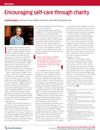 2 citations,
April 2009 in “Bulletin of Experimental Biology and Medicine”
2 citations,
April 2009 in “Bulletin of Experimental Biology and Medicine” Flamena, a liposomal mix, helps skin heal better after a chemical burn.
 2 citations,
December 2004 in “Medicine”
2 citations,
December 2004 in “Medicine” Different hair and scalp disorders cause hair loss or excess hair growth, with various treatments available depending on the specific condition.
 1 citations,
October 2023 in “Frontiers in endocrinology”
1 citations,
October 2023 in “Frontiers in endocrinology” Regulating certain sex hormones may help delay facial aging.
 1 citations,
March 2019 in “Economic Inquiry”
1 citations,
March 2019 in “Economic Inquiry” Balding men value hair restoration highly, willing to pay over $5,000 for a slight improvement.
 1 citations,
October 2018 in “InTech eBooks”
1 citations,
October 2018 in “InTech eBooks” The document concludes that treatments for cicatricial alopecia are not well-supported by evidence, but hair transplantation shows more predictable and satisfactory results.
 1 citations,
May 2017 in “InTech eBooks”
1 citations,
May 2017 in “InTech eBooks” Some cosmetic procedures show promise for treating hair loss, but more research is needed to confirm their safety and effectiveness.
 1 citations,
February 2017 in “Journal of Aesthetic Nursing”
1 citations,
February 2017 in “Journal of Aesthetic Nursing” Men are getting more beard transplants to look better and follow fashion trends.
 1 citations,
October 2008 in “Expert Review of Dermatology”
1 citations,
October 2008 in “Expert Review of Dermatology” Frontal Fibrosing Alopecia is a slowly progressing hair loss condition, likely underdiagnosed, with ineffective treatments, needing more research to understand it fully.
 April 2024 in “Journal of burn care & research”
April 2024 in “Journal of burn care & research” Neck burn scar contracture recurrence is more likely with larger neck defects, and closer follow-up can help detect it sooner.

Recombinant human growth hormone helps burn wounds heal faster by increasing blood vessel growth.
 December 2023 in “International Journal of Science and Research (IJSR)”
December 2023 in “International Journal of Science and Research (IJSR)” Herbal treatments are effective and preferred for hair loss with fewer side effects.
 September 2022 in “bioRxiv (Cold Spring Harbor Laboratory)”
September 2022 in “bioRxiv (Cold Spring Harbor Laboratory)” A new staining method shows a special area in the hair's skin layer with lots of proteoglycans.
 August 2022 in “Research Square (Research Square)”
August 2022 in “Research Square (Research Square)” Implanted special stem cells from hair follicles helped heal wounds faster and with less scarring in mice.
 July 2021 in “British Journal of Dermatology”
July 2021 in “British Journal of Dermatology” Laser treatment for skin conditions VEN and ILVEN is effective and liked by patients.
 June 2021 in “Psychiatria Danubina”
June 2021 in “Psychiatria Danubina” The antidepressant escitalopram likely caused hair loss in a patient.
 January 2019 in “Springer eBooks”
January 2019 in “Springer eBooks” Acne can appear or persist in adulthood due to hormonal changes, external factors, or substance use, and requires appropriate treatment.
 January 2018 in “Springer eBooks”
January 2018 in “Springer eBooks” Different races and genders have unique skin and hair issues, requiring specialized care and more research for effective treatment.
 November 2017 in “British journal of nursing”
November 2017 in “British journal of nursing” Charities help patients manage their own health by providing resources and support.
 April 2017 in “Journal of evolution of medical and dental sciences”
April 2017 in “Journal of evolution of medical and dental sciences” Most women with excess hair growth had Polycystic Ovary Syndrome, and severity wasn't linked to hormone levels.
 May 2016 in “Portuguese National Funding Agency for Science, Research and Technology (RCAAP Project by FCT)”
May 2016 in “Portuguese National Funding Agency for Science, Research and Technology (RCAAP Project by FCT)”  February 2016 in “Online journal of biological sciences”
February 2016 in “Online journal of biological sciences” Henna and honey improved burn healing and hair growth in rabbits.
 January 2015 in “VetPharma”
January 2015 in “VetPharma” Alopecia X causes hair loss in young plush-coated dogs and can be treated with various therapies, but hair may regrow and then fall out again.
 January 2014 in “Journal of the turkish academy of dermatology”
January 2014 in “Journal of the turkish academy of dermatology” Hair transplantation is safe and effective for permanent hair loss due to scarring, with high patient satisfaction.
 January 2012 in “Elsevier eBooks”
January 2012 in “Elsevier eBooks” Hair transplantation is highly effective with careful technique and attention to patient needs.

Wound healing is complex and requires more research to enhance treatment methods.

Hair transplants can cause hair loss if done while lichen planopilaris is active; wait until it's inactive for two years and check with a scalp biopsy first.
 January 2010 in “Elsevier eBooks”
January 2010 in “Elsevier eBooks” Hair transplantation is a treatment for hair loss mainly caused by genetics, with various techniques and potential complications, and results visible after 8-12 months.
 June 2008 in “Springer eBooks”
June 2008 in “Springer eBooks” The document concludes that permanent hair loss conditions are complex, require early specific treatments, and "secondary permanent alopecias" might be a more accurate term than "secondary cicatricial alopecia."
 April 2008 in “Medical & surgical dermatology”
April 2008 in “Medical & surgical dermatology” Certain hairstyles can cause scalp diseases, smoking is linked to hair loss, 5% minoxidil foam is effective for hair loss treatment, and various factors influence wound healing and hair growth.
 April 2005 in “Clinics in Plastic Surgery”
April 2005 in “Clinics in Plastic Surgery” Various surgical techniques effectively treat skin diseases and cosmetic issues.






























